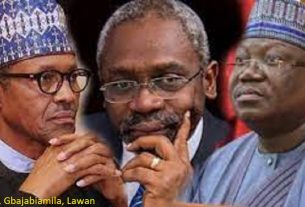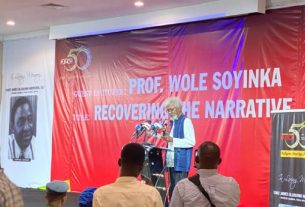By Festus Eriye
After the false start of February 16, Nigerians finally went to the polls yesterday to pick the man who would lead them for the next four years. As you read this, emerging trends would be pointing to the direction they have elected to go.
This election is likely to impact the political landscape in more significant ways than we can imagine because of the starkly contrasting visions of the leading contenders.
If President Muhammadu Buhari and his All Progressives Congress (APC) are re-elected, we may see more of his much-vaunted onslaught against corruption – especially with his firm declaration that it is his duty to jail looters.
We would see continued controls on foreign currency exchange rates and investment in infrastructure projects across the country. But more importantly, he would – at the end of his tenure – have had eight unbroken years to shape the nation in his image.
Were Atiku Abubakar of the Peoples Democratic Party (PDP) to prevail, then we are equally in for interesting times given his ambitious reform agenda. For starters, his signature campaign promise on restructuring the country is to be activated within six months of his assumption of office.
He has also promised to sell of the Nigerian National Petroleum Corporation (NNPC) and discontinue the foreign currency controls of the Buhari administration. We should definitely expect that his approach to the war against corruption would be markedly different. I expect him to roll back a lot of things that Buhari has done in this area in much the same manner that the late Umaru Yar’Adua did after succeeding former President Olusegun Obasanjo.
The outcome of the presidential and National Assembly contest would also affect the governorship and state assembly polls in two weeks. Whenever we have had the presidential contest first, there has tended to be a bandwagon effect, simply because Nigerian politicians are terrified of languishing in the opposition wilderness.
So I expect that whoever wins between Buhari and Atiku, the impact would be profound in states where the margins between the parties are small.
It also means that we may see a greater level of desperation and violence in two weeks as key figures fight for their political lives.
That is par the course as far as Nigerian politics goes. Indeed, this campaign season shows us that not much has changed in the behaviour of our political elite in over five decades. Our elections are still fraught with chaotic preparations, violence, fraud and deliberate action on the part of politicians to make things unworkable.
As usual, the Independent National Electoral Commission (INEC) is caught in the eye of the storm. This is nothing new as virtually all who have had the misfortune of superintending this agency have come away with their reputation in tatters.
A sorry cast of names like Eyo Esua, Michael Ani, Justice Victor Ovie-Whiskey, Professor Eme Awa, Professor Humphrey Nwosu, Professor Okon Uya, Chief Sumner Dagogo-Jack, Ephraim Akpata, Abel Guobadia, Professor Maurice Iwu and Professor Attahiru Jega, highlights how a bunch of distinguished Nigeria were messed up by the electoral assignment.
It is not for nothing that the job has been dubbed a poisoned chalice over the years. Some of these men were mercifully relieved of the burden before they went too far, while a couple were virtually broken by their experiences.
A clear case is Nwosu who was in charge of the June 12, 1993 elections now perceived as one of the freest and better organised in Nigerian history. In the end, that election process was disrupted shortly before the results were announced by the military rulers and entrenched interests who desired a different outcome.
Nwosu was driven into internal exile – taking a virtual vow of silence ever since – simply for doing his job too well.
Jega was another one who left the position of election chief with limited damage to his reputation, still his tenure was characterised by notable shortcomings. We remember how the elections in 2011 were abruptly called off after many voters had been accredited and started voting in several locations.
While the postponement of 2015 was not entirely the fault of the commission – given that the Goodluck Jonathan administration virtually forced it on INEC on account of the security issues in the Northeast, it soon became clear that had the polls gone ahead on the earlier advertised dates they would have been marred by logistics challenges.
The improvements under Nwosu and Jega notwithstanding, the electoral process remains plagued by poor planning, logistics hiccups, fraud and compromise of electoral officers, vote buying and violence.
The shock announcement by INEC’s current chairman, Professor Mahmood Yakubu, in the early hours of February 16 calling off the polls was in keeping with the image of a bungling electoral body.
But with the benefit of hindsight, even the worst critic would admit that the commission deserves some consideration because even the best laid plans can go awry – especially when they are ‘Made in Nigeria’ plans.
Of course, there are legitimate questions to be asked of Yakubu and his team, about how they contrived to deliver a damp squib after four years of preparation. Still, it was not only the commission that was complicit in the latest cock-up.
It is suspicious how a succession of INEC offices in some states quickly went up in flames with the upshot being the incineration of thousands of Permanent Voters Cards (PVCs) and card readers.
What is known so far suggests that this was clearly the work of arsonists. These were not just random criminal minds fascinated by flames: this was clearly the handiwork of people with an interest in the electoral outcomes in their localities.
Several people have also been arrested after scores of card readers and voters cards were found in their possession. In some cases, the readers were located in bushes where they had been dumped. These incidents confirm reports that politicians have been actively going about buying the cards off potential voters.
A day before the abandoned February 16 polling day, hundreds of thugs imported from neighbouring states, were apprehended in Akwa Ibom. Although the elections ended up not holding, these characters still managed to wreak violence in some communities leaving the charred remains of several vehicles in the wake.
Across the states it has been the same story of bloodletting as tension built up towards polling day.
So even if INEC had been perfect in its logistics arrangements, the direct consequence of criminal elements being let loose in their hundreds on hapless communities would have been untold mayhem and disruption of the electoral process.
Again, the point has to be made that the people mobilising and financing hundreds of armed thugs are not INEC officials but politicians across the divide.
One of the big stories of this campaign season was the decision of the electoral body to bar APC from fielding candidates in Zamfara and Rivers States. As at Friday, the former got a reprieve with the commission agreeing to put the party’s members back on the ballot.
Forty-eight hours to polling day, APC in these two states was still trying to convince INEC to include it on the ballot. This crisis situation only compounded the logistics dilemma the commission had to deal with – through no fault of theirs.
The party had sufficient time to address the simple matter of picking its candidates but egotistical leaders and local godfathers insisted on having their way – thereby creating a needless crisis.
It all makes the job of managing elections in Nigeria an impossible one. Perhaps the electoral body can take some consolation from the fact that it being savaged by APC and PDP – which suggests to me that it is doing something right. An agency that has stood up to the ruling party and shut out its candidates in Rivers, and until Friday in Zamfara, certainly has earned the ‘Independent’ in its name.
The Nation





